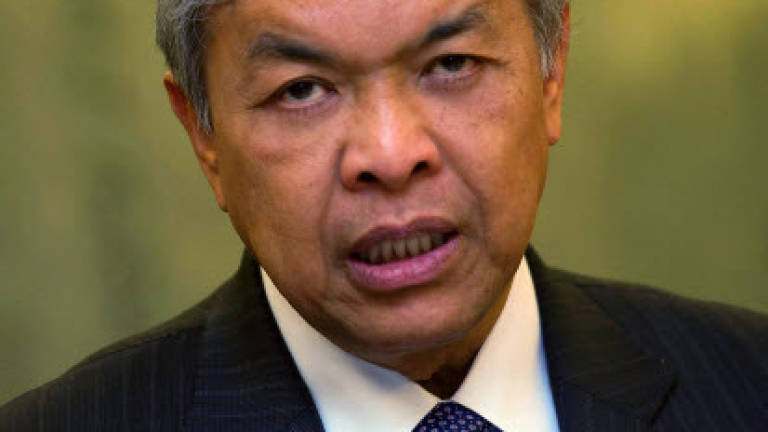M'sia, UNHCR to form joint task force to solve fake refugee cards problem

BALI: Malaysia and the United Nations High Commission for Refugees (UNHCR) have agreed to immediately set up a joint task force to overcome the problem of fake UNHCR cards issued by unscrupulous syndicates.
Deputy Prime Minister Datuk Seri Dr Ahmad Zahid Hamidi (pix) said among the immediate measures to be taken by the task force was asking all UNHCR card holders to re-register themselves with the body.
He said the agreement was reached at a meeting with UNHCR's Assistant High Commissioner Volker Turk, here, yesterday.
"We agreed to add more security features to the existing UNHCR card and that re-registration of genuine card holders should be done," he told reporters after attending the official opening of the Bali Process, here, today.
The Malaysian authorities have found that syndicates have been issuing fake UNHCR cards, one of the factors for the influx of foreign immigrants including those not recognised as refugees, into Malaysia.
Up to August 2015, there were 153,000 refugees and asylum seekers in Malaysia and the majority of them, at 93%, were from Myanmar and the rest from Sri Lanka, Pakistan, Somalia, Syria, Iraq, Iran and Palestine, among the countries.
The fake UNCHR card-issuing syndicates were detected since a few years ago when the authorities arrested several foreign immigrants who were carrying the UNHCR card but during investigation, the cards were found to be fake and they admitted to having entered Malaysia illegally.
Ahmad Zahid said Malaysia and the UNHCR also agreed to cooperate in accepting the arrival of Syrian migrants to the country as was announced by the prime minister at the 70th United Nations General Assembly in New York in October, last year.
"I will also be chairing a high-level committee meeting on these Syrian migrants soon," he said.
When delivering the nation's statement in conjunction with the Bali Process, Ahmad Zahid who is also Home Minister, said Malaysia called for human traffickers to be taken to court, and to see whether the legal provisions of the countries concerned could be enforced together.
He said all member states of the Bali Process wanted practical solutions to the real causes of human trafficking and smuggling of migrants as the crime was increasingly worrying.
"The criminals have managed to dupe various groups, especially women and children, and they carry out this activity as a lucrative business.
"So, concerted efforts are needed to prevent these criminals from bribing enforcement officers in order to conduct their illegal activity."
Ahmad Zahid said the meeting here also wanted an integrated approach to ensure that the source countries be responsible for their citizens' action of entering other countries illegally.
"I am confident the willingness of all countries to share their information and experience to combat human trafficking and smuggling could result in the creation of a data base for a concerted strategy," he said.
The deputy prime minister said a long-term approach was necessary to eradicate this criminal activity as it could create various other problems, including threatening a country's security and public order.
The one-day Sixth Ministerial Conference of the Bali Process on People Smuggling, Trafficking in Persons and Related Transnational Crime (Bali Process) was jointly chaired by Indonesian Foreign Minister Retno Marsudi and his Australian counterpart Julia Bishop.
It was participated by 48 member states and representatives of the UNHCR, International Organisation for Migration (IOM) and United Nations Office of Drugs and Crime (UNODC), among others, as well as observers.
The conference is a major platform in tackling the issue in the Asia-Pacific region.
Ahmad Zahid said the source countries attending the conference agreed to impose tighter control at their respective border areas, to prevent the human trafficking and smuggling problem from being shouldered by other countries.
"We admit it's not easy to curb this, especially stopping people who want to migrate to earn a living in another country, as the human trafficking victims don't regard themselves as victims but economic opportunity seekers."
He said as an additional measure to prevent illegals from sneaking into the country, the government would tighten security control by erecting or rebuilding fences along the border in the peninsula, Sabah and Sarawak.
Besides that, he said, the authorities would be using drones and satellite for surveillance in the areas involved.
"We know that many rat trails (through which illegals enter the country) have become elephant trails and the border fences have been damaged, but we are taking action on this," he added. — Bernama